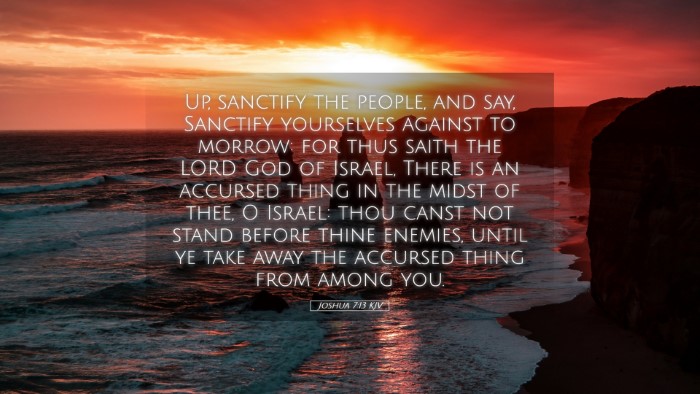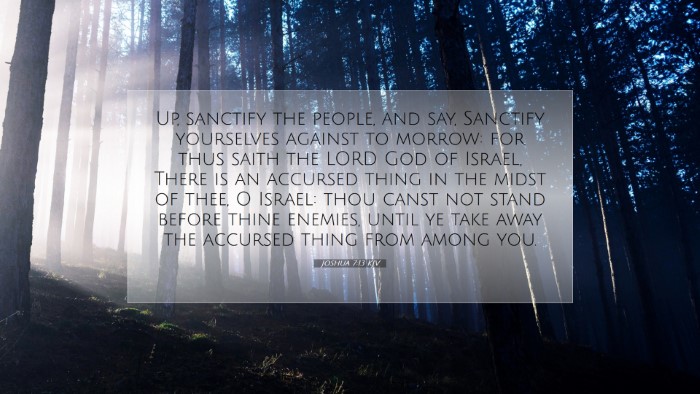Commentary on Joshua 7:13
Joshua 7:13 states, “Get up! Consecrate the people and say, ‘Consecrate yourselves for tomorrow, for thus says the Lord God of Israel, “There are accursed things in your midst, O Israel. You cannot stand before your enemies until you take away the accursed thing from among you.”’” This verse captures a pivotal moment in the history of Israel, during which the nation learns the consequences of sin and the necessity of holiness in their covenant relationship with God.
Contextual Analysis
In the preceding chapter, Israel faced a crushing defeat at Ai, a stark contrast to their victory at Jericho. This spiritual and military setback was not merely a strategic failure; it was rooted in disobedience to God’s commands regarding the spoils of war. Achan's sin had brought about God’s wrath, illustrating the communal nature of sin within the nation. The enormity of collective guilt necessitates a high degree of accountability, illuminating the nature of God’s justice.
Theological Insights
Consecration and Holiness
Matthew Henry emphasizes the importance of consecration for the people of Israel. The act of consecration, or sanctification, signifies setting oneself apart for God. In this passage, it is a call for the nation to purify themselves before the Lord, indicative of the seriousness of their situation. Sin disrupts fellowship with God, and holiness is requisite for approaching Him.
Understanding Sin in Community
Albert Barnes notes the collective implications of Achan’s sin: “The whole nation was suffering for the sin of one.” This concept elucidates how individual actions can affect the broader community and exemplifies the communal responsibility established in the Old Testament covenant. The sin of one man brought defeat, highlighting the need for vigilance in personal and communal conduct.
Divine Instruction and Human Action
Adam Clarke points out that the Lord's command to “get up” indicates an urgent need for action. This urgency reflects God's desire for His people to recognize the gravity of the situation. The divine instruction parallels the call to repentance, underscoring the proactive nature of faith where believers must recognize their sinfulness and undertake steps toward restoration.
Practical Applications
- The Call to Individual Responsibility: While collective sin is addressed, individual accountability remains paramount. Each believer must examine their heart and actions to avoid becoming a stumbling block to the wider body of Christ.
- The Urgency of Repentance: The phrase “get up” serves as a metaphor for spiritual awakening. It suggests that believers should not linger in sin but swiftly return to God, emphasizing a lifestyle of repentance and renewal.
- Understanding God’s Holiness: The command to consecrate oneself involves recognizing God’s holiness. Believers today must cultivate an awareness of God's magnitude and purity, which in turn motivates a lifestyle aligned with His will.
Conclusion
Joshua 7:13 serves as a sobering reminder of the weight of sin and its ability to corrupt the community of believers. It challenges modern-day Christians to reflect on the seriousness of their personal and communal walk with God. As pastors, students, theologians, and scholars delve into this scripture, the insights revealed throughout history remind us of the need for continuous purification and the pursuit of holiness. Ultimately, the call to action remains clear: to consecrate ourselves and to earnestly seek God’s favor, recognizing that His presence is contingent on the removal of sin from among us.


